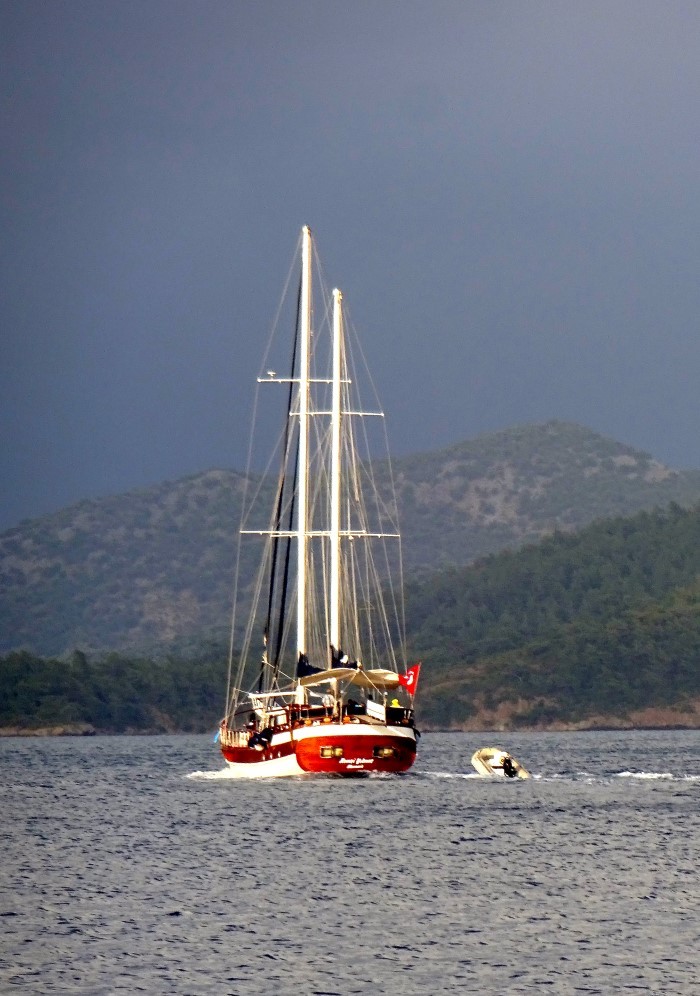Something for everyone
Mykonos & Delos Greece One day when the wind seemed lighter, we decided it was a good idea to go 20 miles north...

Fethiye, Turkey
When we first checked into Turkey two years ago, we were told that we had to purchase a Blue Card. Turkey’s Blue Card Scheme is designed to keep the country’s coastal waters clean by requiring people on recreational boats to use holding tanks and pump out at designated stations at frequent intervals, or face consequences. The Blue Card program was really created to deal with the huge number of Gulets (traditional two, or three-masted sailboats) in Turkey that carry hundreds of people on day trips and weeks-long holidays.
It is always a good practice on a boat to use holding tanks. And whenever we visit a country, we work hard to make sure we follow the rules and regulations; we are, after all, just guests in their land, and we have no desire to end up in jail with Russian prostitutes. While the goals of the Blue Card Scheme are noble and the whole thing probably sounded good on paper, it doesn’t work well in practice. The law requires that all grey water from showers and sinks, and black water from toilets, be held in tanks and later pumped out. Most boats, even new boats, do not have the plumbing systems and tanks to do this. Also, you need infrastructure to pump the tanks out and transfer the discharge to treatment facilities, of which few exists in Turkey. Berkeley East has grey and black water tanks, but our showers drain over the side, so meeting the Blue Card requirements was challenging. Luckily it was warm enough to swim when we were at anchor.
At this point, much of the country does not follow the Blue Card Scheme, but we had heard that it is truly enforced in the south, and fines can be stiff, huge fines up to $6,000. So upon entering Southern Turkey this year, we diligently followed the Blue Card restrictions, wanting to not only obey the law, but help the environment as well. After a few days in some beautiful anchorages, we searched out the closest station to empty the holding tanks at a marina in Fethiye. We had been told, by other cruisers, that the waters in this area were pristine, so imagine our surprise when we entered the marina and saw water as filthy as any place we have ever been. Even if boats were pumping out, they were forgetting to throw their rubbish, plastic bottles and cigarette butts in the trash rather than into the water. We did our duty and pumped out Berkeley East’s holding tanks, then took a slip in the marina for several days to see the area. During that time, we only saw a handful of boats come into the station. It didn’t look like the scheme was working.


Luckily, the town of Fethiye was an interesting place that caters to tourists without losing its charm.

We quickly found a restaurant on the water, actually on the road across from the water. If you closed your eyes, you could almost believe that the traffic noise was really the sound of the sea. It was a family place with excellent food and the best bread, shaped like a football.


We always like to try different places in a port, but we would return to the football restaurant three times before leaving Fethiye.
There is a lot to see in Southern Turkey, but since we had decided this would be our last stop in the country, we would have to pick and chose sites that could be visited in one day of rental car touring. We were both reading the novel “Birds Without Wings,” a story about the impact of religious intolerance, over-zealous nationalism, and the war that often results, so a visit to Kayakoy, the town that is central to the story, was at the top of our list.


From there, we chose to hike along a section of the Lycian Way. It was a short stretch of this historical trail that follows the Mediterranean shores of Turkey through breathtaking landscapes along crystal clear water for over 300 miles. Now we could see the beautiful water that our fellow cruisers were talking about. Perhaps the Blue Card scheme was working after all.


Our hike ended at one of the most picturesque beaches is the Mediterranean, Oludeniz, which translates to Blue Lagoon.


The only problem was that our car was still in Kayakoy, so we while we would have preferred to sip another Mango smoothie, we needed to hike back over the mountain to our ride.

Oludeniz is regarded as one of the best places in the world to paraglide due to its beautiful panoramic views and the ability to land right on the beach.

As we were leaving Turkey the next morning, we saw several boats out early, heading up the coast. One powerboat, however, was moving offshore and we assumed, like us, they were going to Greece. But after a while, we heard another boat call on the radio asking where they were going. They responded and said they were going out to empty their holding tanks. They were still in Turkish waters, but it was much better to go offshore than to dump their holding tanks in the bay.